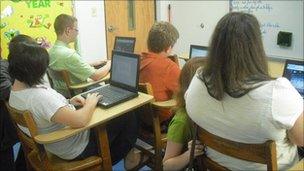US communities pin hopes on 'super wi-fi'
- Published

There are high hopes for "wi-fi on steroids" in the US
Wi-fi as most people know it is about to get a major shot in the arm in the US. After two years of talks, officials have approved the use of "white spaces" that will enable wireless broadband to reach greater distances than ever before, as the BBC's Marc Adams reports.
White spaces are unused, unlicensed frequencies that fall between TV channels, freed up as older analogue transmissions are converted into digital signals.
Put to use carrying broadband instead of television signals, the frequencies could spell a revolution.
It's been described as "super wi-fi" or "wi-fi on steroids", and the US Federal Communications Commission (FCC) is hoping it will reshape the broadband landscape - transforming whole cities and towns across the US into giant hot spots, and helping rural communities close the broadband access gap.
"This technology is a boon to urban and rural areas," said Julius Genachowski, head of the FCC. "My hope and expectation is that it will lead to significant innovation and investment."
The frequencies are better at penetrating obstacles like walls, and the FCC says "super-wi-fi" has the potential to cover areas 16 times larger than traditional wi-fi.
It works like this: a fibre-optic cable carries a broadband signal to a central location in a city or town. That signal hub, owned by either a municipality or company, then transmits the broadband signal to a variety of receiving sites by way of the "white space" frequencies on the TV spectrum.
A receiving site pulls the signal in with an antenna and acts as a wireless router, transmitting the signal to any laptop or desktop computer in its range.
Rural test zone
"It truly is wi-fi on steroids," says Neeraj Srivastava, from SpectrumBridge, a Florida-based tech firm that has been eagerly anticipating the FCC's announcement.
The company has already developed a way to make use of the unused TV spectrum for expanded wi-fi and expects that in the next few years, consumers will see an explosion of "white space acquisition technology" in laptops, smart phones and tablet computers.
The small, rural town of Claudville in the US state of Virginia has been testing this technology for the past year.
In a town where only 25% of the population is able to access high-speed internet, even the limited trial has made an impact.
Students are able to research online, job seekers are able to come to the local cafe to look for work, and a number of residents enjoy unrestricted broadband access in their homes.
"We're out in a rural area and telecommunications companies are reluctant to invest in places like this to provide high speed internet," said Roger Hayden, Dan River District Supervisor who oversees the Claudville area.
'Battle'
In 2004, Mr Hayden started the local Broadband Task Force and has been fighting ever since to bring broadband to the town.
"It's been a battle," he said. "Sometimes it's like beating your head into a brick wall."
Claudville's only school, Trinity Christian, is one of the handful of places in the town receiving the broadband test signal.
Pastor Jerry Whitlow, who helps run the school, says the uninterrupted high-speed internet access has allowed the 73 students there to do research, connect with people in other countries and even talk to their Congressman on a webcam - all things that students in better-connected areas take for granted.
"We shouldn't have our children penalised based on where they live," he said. "Even though we're a rural community, we should give the best education possible."
Before the test, the school paid hefty fees for broadband by way of satellite. But the moment a cloud gathered overhead, the signal would drop.
Now, because it was chosen as a test site for the white space technology, the school receives free internet with no dropped signal, transforming Pastor Jerry into a vocal advocate.
"This technology should be in every rural community," he said. "We talk about no child left behind. Well, this is one of the ways of putting feet to that."
'Toe-hold'
Down the road is the Cafe of Claudville, another test site that has seen tangible results.

The small town of Claudville has been testing this technology for the past year
Michelle Lawson, the cafe's owner, says the broadband streamed into her computers has helped business, drawing a number of job-seekers who don't have internet access at home.
This has given Ms Lawson a front-row seat to witness the economic decline in her town, which she says has been "hit hard". But she says the online access is giving people a chance.
Unemployment in Claudville stands above the US average, at 11.5%. Once a proud tobacco farming community, it migrated to textiles and manufacturing, which imploded in the mid-1990s as jobs went abroad.
Now it is a struggling town searching for an economic identity. Mr Hayden believes increased connectivity will bring the opportunities the town's residents have so desperately needed for years.
"We're between a rock and a hard place here," said Mr Hayden. "I thought if we were to give high-speed internet to people in these rural areas, it would give them a toe-hold to get themselves better off."
With the FCC announcement, Mr Hayden hopes to expand high-speed internet access to 95% of the town's residents by the end of this year. It is an ambitious goal. But the town is accustomed to challenges.